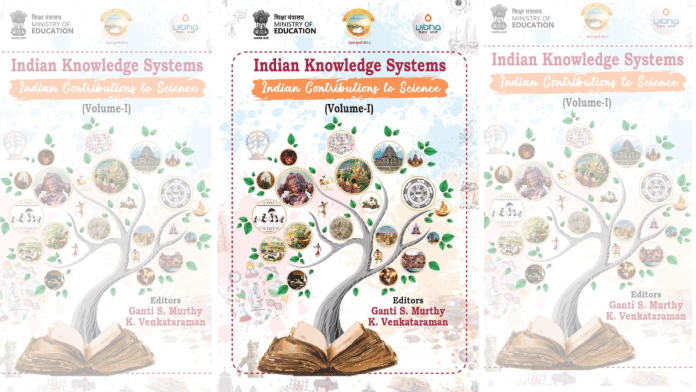New Delhi: A newly released book by the Union Education Ministry’s Indian Knowledge Systems (IKS) division spotlights India’s ancient contributions to science, including an account of a health conference held thousands of years ago at the foothills of the Himalayas.
The book highlights how ancient Indian teachers—key contributors to Ayurveda—gathered to discuss ailments affecting not just humans, but also animals and plants. It traces Ayurveda’s roots to the Vedas, and dates its codification to at least 4,000 years ago—predating Hippocrates, known as father of Western medicine, by over 1,500 years.
The book, ‘Indian Knowledge Systems: India’s Contribution to Science – Volume 1’, is authored by eight academicians and edited by G.K. Venkataraman, former curator at the National Council of Science Museums, and Professor Ganti S. Murthy, professor at IIT Indore and National Coordinator for the IKS division.
It features eight chapters, including the origins of IKS, Indian astronomy and instruments, ancient mathematics and chemistry, Ayurveda, medicinal plants, and traditional sustainable agriculture.
Additionally, it highlights how colonisation severely damaged India’s Indigenous knowledge systems, which had evolved over thousands of years. It also mentions how the revival of yoga and Ayurveda played a key role in the revival of IKS.
The book is meant for higher education institutions, research scholars and anyone who is interested in knowing about IKS, the Division said.
Describing the book as a celebration of India’s rich intellectual legacy, the editors note stated, “This book is a testament to the ingenuity, creativity, and wisdom of ancient Indian scholars and scientists who made significant contributions to various fields of knowledge.”
They further said that the book will not only “inspire” readers to explore India’s knowledge traditions but also serve as “an essential compass for anyone looking to navigate the vast and vibrant ocean of Indian knowledge.”
Also Read: Back to the future: Govt launches national contest to recreate India’s traditional astronomy tools
Focus on Ayurveda
The book describes a “remarkable” and “well-documented” event in the history of Āyurveda—a conference on health and disease management held thousands of years ago, whose proceedings have survived to this day.
According to the book, Āyurvedic ācāryas (teachers) from across India and neighbouring regions gathered on the slopes of the Himalayas with the shared goal of addressing the growing issue of ill-health.
The discussions focused on the emergence of diseases that were affecting the longevity and happiness of all living beings.
During the conference, the book stated, Bharadvāja (a vedic sage) presented the foundational concepts of Āyurveda, outlining the three core principles of etiology (the scientific study of the causes of disease), symptomatology (the set of symptoms characteristic of a medical condition or exhibited by a patient), and therapeutics as essential to achieving well-being.
These principles, it said, were thoroughly debated and ultimately accepted by the scholars as the basis of a structured medical system.
The conference was chaired by Atreya, one of Bharadvāja’s renowned students, the book notes, citing references from the Charaka Samhita, a foundational Sanskrit text on Ayurveda.
The book also mentioned the names of at least 50 scholars who had attended that conference.
It also carries an illustration depicts an ancient eye surgery on a horse, based on the Śālihotra Saṃhitā, a classical Sanskrit veterinary text, highlighting the advanced medical knowledge of ancient Indian veterinarians in treating animal ailments.
The book states that modern medicine is increasingly embracing holistic approaches, recognising the role of diet, lifestyle, and mental health—areas long addressed by Āyurveda. “All these ideas already find practical expression in the way Āyurveda understands and manages health and disease. This underscores the continuing relevance and importance of Āyurveda in today’s healthcare landscape,” it stated.
Emphasising that Ayurveda has a “crucial role” to play in modern healthcare, the book states that it should not be seen merely as a reminder of past glory but as a living example of India’s knowledge system with contemporary relevance.
“Its vast clinical experience, accumulated and documented meticulously over millennia, should be utilised to benefit those who suffer,” the book stated.
Colonisation effects
The book explains that colonisation was not just political takeover, but a complete system of control—economic, cultural, and intellectual. To justify their rule, colonisers portrayed Indian society as “barbaric and uncivilized,” masking exploitation under a so-called “civilising mission.”
It outlines three overlapping phases: “brutal conquest, economic exploitation, and intellectual subjugation.” That began with violent invasions, such as the Arab conquest of Sindh in 712 CE, where sacred sites like the Shiva temple at Debal were destroyed.
“This physical destruction was a calculated strategy to demoralize the populace and uproot the sacred geography that had bound the civilization together for millennia,” it said.
The Portuguese followed with the Goa Inquisition in the 16th century, during which “a royal decree in 1560 CE outlawed Hindu temples and rituals” and punished those who resisted conversion.
British colonisation brought systematic economic exploitation. After gaining control in 1757, “trillions of dollars were siphoned from India to Britain,” and traditional industries like textiles were dismantled. Policies prioritising profit over people led to massive suffering, including the Great Bengal Famine of 1770, which “claimed up to ten million lives.”
Intellectual colonisation, it said, came through the English Education Act of 1835. Thomas Macaulay aimed to create a class which was “Indian in blood and colour, but English in tastes, in opinions, in morals and in intellect.”
However, the book states that despite this, India’s resilience endured. “Decolonization and colonisation proceeded simultaneously,” and the revival of IKS continues today, reclaiming a rich intellectual legacy, it adds.
(Edited by Tony Rai)
Also Read: Centre forms expert panel to review UGC draft curriculum amid concerns over ‘grave defects’






